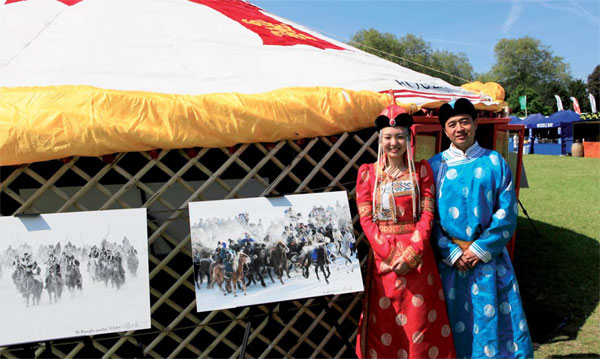Pure joy on horseback

| Equex's Mongolian-themed tent at Royal Windsor Horse Show. Photos by Cecily Liu / China Daily |
Chinese equestrian promoter jumps domestic barriers, gallops into global field
Linda Lee says she fell in love with the equestrian world when she rode a horse at east China's Jiulong Mountain in Zhejiang province five years ago - so much so that she was inspired to start a company developing equestrian sports in China.
In 2012, the entrepreneurial Shanghai native founded Equex in her hometown, and the company rapidly expanded abroad with offices in London, New York and Dubai. The company provides consulting and management services for the equestrian industry, primarily in horse racing, polo and equestrian events.
"I think horse sport is great for both the body and mind, and, different from many other sports, it is so very elegant and graceful," Lee says.
Lee, who also has started IT and cultural firms, wanted to share her love for horses with a wider part of Chinese society. That is not an easy task since equestrian events are just starting to become popular in China. There are other challenges, including restrictions on moving horses out of China due to international animal health issues.
One big breakthrough for Equex last year was the hosting of the first Shanghai International Horse Festival in December at the Shanghai World Expo Exhibition & Convention Center. It was held with the help of Horse Power International, a British company that assists with organizing two major events in the United Kingdom, the Royal Windsor Horse Show and Olympia, The London International Horse Show.
The festival was a week of equestrian performance, competitions, symposiums, banquets and a charity auction. It attracted about 50,000 viewers, at its peak about 6,000 to 7,000 a day. Tickets were 580 yuan ($93; 68 euros) and up. It was deemed such a success that Equex decided to host it again this year, from October 24-26, at the same venue.
The festival demonstrates Equex's business model - drawing together different international partners' strengths to enlarge the equestrian market in China.
"Equestrian events have a long and established history in both Europe and the Middle East, which are our key international markets. We frequently take our Chinese clients to these markets to learn about how horse events are organized. And we act as the agent to bring expertise from these markets to China," Lee says.

Although Equex is a young company, it has about 30 employees, most of whom are based in China, and a team of experienced professionals leading the charge. Its Chinese team includes Chang Wei, former director of the equestrian division of the General Administration of Sport of China, and Meiwa Dickens, an official for equestrian events at the 2008 Beijing Olympic Games.
Simon Robinson heads Equex's UK operation. He previously served as crown equerry, responsible for the queen's equestrian interests at Buckingham Palace, Windsor Castle and the Royal Stud at Hampton Court.
Robinson says the Shanghai festival is the first project he worked on with Lee. The festival relied on UK expertise, from coordinating many events under one roof to details like lighting and design.
"It was a spectacular event. This year it'll be bigger and better, with more show jumping and a larger capacity," Robinson says.
To give Equex more exposure, the company is participating in a number of prestigious international equestrian events.
In mid-May, Equex set up a tent inspired by traditional Inner Mongolian culture at the Royal Windsor Horse Show, an event that takes place next to Windsor Castle.
"Horse racing is a big part of Inner Mongolia's culture. There the cost of owning and looking after horses is a lot lower than in the cities, hence it is a sport the Inner Mongolian people enjoy on a day-to-day basis," Lee says.
She says horse racing in Inner Mongolia does not have as many rules as racing and equestrian events internationally, but this different perspective is interesting for British visitors.
Inside the round tent was an exhibition of photography by the Inner Mongolian artist Zhao Ruyi. The photographs show horses running wild across the grasslands in groups, energetic and strong. The images capture colors of the horses, the grasslands and the sky, making them look almost like oil paintings.
The tent also displayed many objects relating to China's horse culture, including a map of Inner Mongolia and traditional clothes from the region, which are colorful and elaborate. Two workers in traditional garb greeted visitors.
Despite the success that Equex has achieved, Lee says the business is still at a starting point and much more needs to be done. Many challenges in China's equestrian industry need to be tackled before the industry can really take off.
Lee says she believes the key for investing in the equestrian business is a long-term strategy - a large investment was needed to launch Equex and that cannot be recouped in the short term.
"We've generated some revenue so far, but they are far from our investments," Lee says. "We need to look for the long term, as I believe there is great potential for growth."
Lee declined to reveal financial figures, but the company collects fees for advising overseas equestrian businesses that want to enter the Chinese market. It earns revenue from sponsorships, ticket sales and catering and hospitality services accompanying equestrian events it manages.
Backing often comes from luxury brands in China that wish to be associated with the equestrian world. These brands often sponsor events like Swiss watchmaker Longines supporting the Shanghai festival. "Luxury brands that work with us already have an established name in the Chinese market, but our events further help them with the brand-building process," Lee says.
One important challenge facing China's equestrian industry is a lack of government support, she says. As a result, equestrian athletes may find it hard to obtain professional advice and training.
Roly Owers, chief executive of World Horse Welfare, adds that China's quarantine controls and prohibitions on horse race betting in China also hinder the growth of the industry.
Unlike the UK and many other nations, China has not been certified as disease free by the World Organization for Animal Health. To be considered for that status, it needs to conduct regular and standard tests for horse health and apply for inspection. The organization designates some countries as disease free for trade purposes from certain animal diseases.
But China's current status means that overseas horses that enter China are not allowed out again because of the concern that they might spread diseases caught in China. Chinese horses are also not allowed to leave the country, Owers says.
This means it is difficult for China to host world-class horse competitions, because international horse owners are unwilling to send their animals to China. It also means that China cannot have its horses compete in major international competitions alongside the world's best horses.
Owers says horse race betting being illegal in China poses funding challenges since such betting is a large part of the revenue for the racing industry in countries like the UK.
But company officials say it looks like China's equestrian industry is gradually opening up despite the challenges, inviting foreign participation and creating opportunities keenly welcomed by businesses in many countries with an established horse racing culture.
Irish company Coolmore secured a deal to help the northern city of Tianjin build a $2 billion national equine center in 2012. Singapore Turf Club is helping the China Horse Club of Tianjin introduce the China Equine Culture Festival to Singapore this year.
Also this year, Britain was allowed to export thoroughbreds and sports horses to China under an agreement signed by Zhi Shuping, China's director of the State Administration of Quality Supervision, Inspection and Quarantine, and Owen Paterson, Britain's secretary of state for environment, food and rural affairs.
Lee says this agreement is a big breakthrough for the UK, adding that Britain has the potential to export a lot more equestrian expertise to China.
"As China's equestrian industry is just starting to develop, it doesn't just need horses. There are many sub-sectors like horse healthcare and horse feed that China also needs a lot of help with. The business opportunities for the UK and other countries is huge," Lee says.
Cecily.liu@chinadaily.com.cn
(China Daily European Weekly 05/30/2014 page19)
Today's Top News
- Takaichi must stop rubbing salt in wounds, retract Taiwan remarks
- Millions vie for civil service jobs
- Chinese landmark trade corridor handles over 5m TEUs
- China holds first national civil service exam since raising eligibility age cap
- Xi's article on CPC self-reform to be published
- Xi stresses improving long-term mechanisms for cyberspace governance































